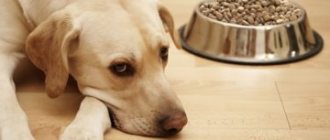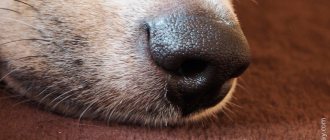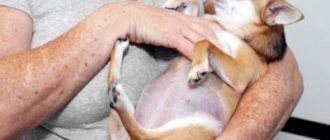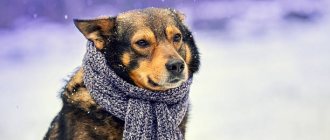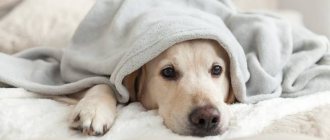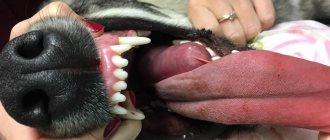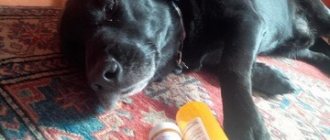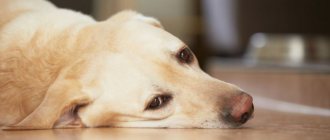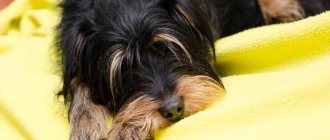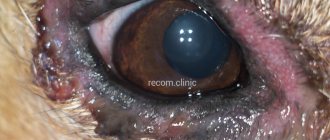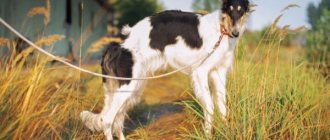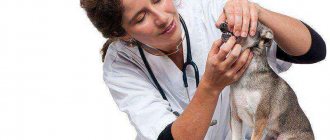Causes of excessive salivation
Dog saliva is a viscous fluid that is produced by three different salivary glands: the parotid, sublingual and submandibular.
It is also secreted by glands located on the sides of the tongue. Saliva contains enzymes such as maltase and ptyalin, which help break down food.
Increased salivation develops for various reasons: physiological, psychological or pathogenic.
Physiological reasons
Excessive drooling is a feature of some dog breeds: boxers, bulldogs, St. Bernards, Great Danes.
Some breeds, as a result of selective breeding, have been awarded this feature - drooling.
Physiological causes of drooling also include increased physical activity, a reaction to food or taking medications.
Some dogs drool if they are fed a bitter tablet or slurry.
Psychological reasons
Increased salivation can occur during stressful situations. Some dogs get motion sickness when traveling in a car or other transport, and they begin to drool and foam profusely.
Pathogenic causes
Increased saliva production can be a symptom of certain diseases:
- Stomatitis is an inflammatory process affecting the dog’s oral mucosa. At the same time, the animal has difficulty chewing food and salivates profusely. The mucous membrane is swollen, red, and there may be ulcers or wounds on the gums and cheeks.
- Periodontal disease. The disease is typical for older animals. A bad smell appears from the dog’s mouth, and in advanced cases, teeth begin to fall out.
- Infection. Drooling is observed in infectious diseases such as rabies, leptospirosis, distemper, and enteritis.
- Epilepsy. Increased salivation may be a harbinger of an imminent epileptic seizure.
- Poisoning. A dog can be poisoned by any food or substance: fatty foods, household chemicals (including detergents), heavy metals, etc. When poisoned, the animal drools or foams, vomits, and has bowel movements.
- Worms. Drooling can occur with severe helminthic infestation.
Dogs are susceptible to diseases of the teeth and gums, which are often accompanied by drooling
Excessive salivation (hypersalivation) in animals
Ptyalism (hypersalivation, sialorrhea) is an increase in the secretion of the salivary glands.
- Functions of saliva
- Causes of ptyalism
- Diagnostics
- Treatment
Functions of saliva.
The secretion of saliva is regulated exclusively by the central nervous system. Its stimulation is provided reflexively under the influence of the smells and taste of food and other environmental factors.
Saliva is necessary for the perception of taste stimuli, for sucking (in newborns), and for wetting solid pieces of food before swallowing. Serves as a solvent for nutrients.
By moisturizing the oral cavity, it keeps it clean and prevents the spread of infectious agents.
This is achieved, first of all, by constant rinsing of the oral cavity; saliva contains substances with antibacterial and antiviral properties.
Saliva is the secretion product of three pairs of salivary glands: sublingual, submandibular and parotid. In addition, the secretion of small glands located on the mucous membrane of the lateral walls of the tongue and cheeks enters the oral cavity.
Liquid saliva, without mucus, is secreted by the serous (parotid) glands, thick saliva containing a large amount of glucoprotein (mucin) by mixed (sublingual and submandibular) glands.
Since their parenchyma contains both serous and mucous cells.
All major salivary glands are innervated by both the sympathetic and parasympathetic nervous systems. Depending on the amount of mediators, acetylcholine and norepinephrine, the composition of saliva changes. The sympathetic nervous system causes the secretion of water-poor saliva that is more viscous than when the parasympathetic system is stimulated.
Acetylcholine, in addition, causes contraction of the myoepithelial cells around the acinus (the terminal secretory section of the salivary gland), as a result of which the contents of the acinus are squeezed into the gland duct. Acetylcholine also promotes the release of bradykinin, which in turn has a vasodilating effect.
Vasodilation increases the secretion of saliva.
Causes
Stimulation of salivation in physiologically healthy animals can be caused by various reasons.
It happens that normal saliva production may seem excessive in animals (in some dog breeds, especially those with heavy damp jowls, such as Bloodhounds and Newfoundlands and other similar breeds), salivation is even increased as the loose skin around the mouth accumulates saliva and then it leaks out out. This condition is called false ptyalism.
Increased salivation in animals often manifests itself when they are petted, due to an excess of tender feelings (often in cats). At the sight of food (before feeding) or at the sight of a treat. When giving medicine, be it tablets, suspension, aqueous solution or any other form of medicine that tastes bad to the animal.
Other pets drool when they are very nervous; cats, when feeling tense, begin to lick themselves excessively, as this helps to calm down. This licking can promote increased salivation. During heavy physical activity (competition, long-distance running, etc.).
All these reasons and some others in physiologically healthy animals lead to drooling, which is usually mild and does not last long.
If drooling that is excessive and continuous for a long time is not normal and typical for your pet, this may be a sign that something is wrong with your pet.
The cause of the pathology of ptyalism in animals can be of infectious or non-infectious origin; disorders of the central nervous system are the most common causes of ptyalism and subsequent drooling. When such symptoms appear, you should always pay attention to the behavior of the animal and the possible cause of drooling.
- Poisoning - with insecticides during treatment against ectoparasites, and other toxic substances upon contact with animals;
- Dental problems (stomatitis, gingivitis, caries, tartar, etc.);
- Foreign object in the mouth;
- Dislocation of the jaw - when it is impossible to close the mouth;
- Heat stroke - when the mouth is open, saliva evaporates, which is a mechanism of thermoregulation, increased blood supply to the tongue and saliva secretion (tight, poorly ventilated muzzles when walking in hot weather, physical activity, active games, etc.);
- Portosystemic shunt is a liver shunt (this is an abnormal vessel that connects the portal and caudal vena cava. Similar to an abnormality of the liver circulation, in which part or all of the blood, bypassing the liver, enters the systemic circulation through portosystemic shunts. In this case, physiological detoxification does not occur in the liver blood. Various types of neurotoxins, pseudo neurotransmitters, uric acid, fatty acids, phenols, mercaptan and other unknown substances - waste products of intestinal microflora cause hepatic encephalopathy, often accompanied by hypersalivation and nervous manifestations);
- Chronic renal failure;
- Eating, licking some species of lizards and toads;
- Bites of certain types of insects (if the animal tries to hunt or eat these insects);
- Diseases of the gastrointestinal tract (inflammation of the esophagus, tumor of the esophagus, hiatal hernia, bloating, stomach ulcer);
- Tumor of the mouth or salivary glands;
- Damage to the salivary glands, salivary gland cyst;
- Traumatic brain injury;
When the body is infected, the central nervous system is often affected by:
- Rabies (bites by other animals, often wild or stray ones, the behavior of the animal itself will also change greatly);
- Botulism (food poisoning from low-quality canned food if production technology is not followed, dried products, more often freshwater fish, etc.);
- Tetanus (open fresh wounds in contact with soil); etc. when infected with these diseases, an accurate medical history is needed.
In cats, frequent increased salivation occurs during respiratory tract infections (rhinotracheitis, calicivirosis), especially if the drooling is accompanied by watery eyes and nasal discharge, sneezing, fever, loss of appetite, ulcers and erosions in the oral cavity.
Diagnostics
As you can see, there are many different reasons for excessive salivation. When contacting a veterinarian, you will need to provide as much detail as possible about the animal's health, including its vaccinations, medications used, possible exposure to toxins, and other symptoms associated with drooling.
Your doctor will need to differentiate between drooling caused by difficulty swallowing and drooling from nausea, accompanied by smacking and gagging. It is also necessary to perform a complete physical and neurological examination of your animal.
Diagnostic tools may include x-rays, ultrasound and analysis of the clinical and biochemical composition of the blood, tissue biopsy, and swabs from mucous membranes.
Treatment
Before contacting a veterinarian, inspect the open oral cavity yourself and if you find a foreign object, remove it if possible. If a large amount of saliva forms after interacting with frogs, lizards, etc., rinse the oral cavity thoroughly. After physical activity, give the animal a chance to rest, etc.
All other causes of ptyalism are determined by a veterinarian, carrying out the necessary diagnostic tests and appropriate treatment.
The article was prepared by doctors of the therapeutic department "MEDVET" © 2014 SEC "MEDVET"
Source: https://med-vet.ru/stati/terapiya/chrezmernoe-slyunootdelenie-u-zhivotnyx/
How to recognize excessive drooling in a dog
Drooling is often accompanied by other symptoms that can help identify the cause of the condition. If your pet has pain in his gums or teeth, he refuses to eat or eats carefully and slowly, does not allow his face to be touched, or reacts painfully and restlessly to touch.
In case of poisoning, the animal experiences diarrhea, vomiting, accompanied by profuse salivation. With infectious diseases, the dog becomes apathetic and its body temperature rises.
Which breeds are more susceptible
In representatives of some breeds, hypersalivation is due to peculiarities of the anatomical structure. These are dogs with massive muzzles, loose, fleshy jowls and shortened jaws:
- Shar-Pei;
- Maltese;
- bulldogs;
- boxers;
- Saint Bernards;
- Newfoundlands;
- mastiffs,
- Great Danes;
- Caucasian Shepherd Dogs;
- bloodhounds.
These dogs drool for any reason: in cold or hot weather, before eating, out of joy or excitement. You can often notice saliva on them during sleep. The phenomenon, which is called false ptyalism, is not considered a serious fault of the breed, but many breeders try to prevent dogs that are too “loose” from being bred.
When choosing a puppy, it is advisable to pay attention to its parents. If they are constantly slobbering and getting everything dirty, then their babies will be the same. In this case, all that remains is to accept it and constantly wipe the dog’s face.
Diagnosis and treatment
If your pet suddenly begins to drool excessively, it is necessary to conduct a diagnosis and identify the cause of this condition.
Remember if your pet came into contact with toxic substances or new food.
If increased salivation begins when traveling in a car or other transport, you can give your pet one of the following drugs before the trip: Serenia, Barbavil, Aeron, etc.
The dosage is calculated based on the weight of the pet.
If an infection or disease of the teeth or gums is suspected, the doctor examines the pet, assesses the condition of the mucous membranes, and notes the presence of other symptoms. The veterinarian also prescribes tests: blood and urine tests, if necessary, ultrasound and x-rays, rinses from the mucous membranes.
If there is excessive salivation, you should consult a specialist.
Treatment depends on the underlying cause:
- Stomatitis and other diseases of the oral cavity are treated by brushing the teeth and applying ointments and gels that contain an antibiotic to the inflamed areas.
- In case of poisoning, the pet is given activated carbon or enterosgel. Smecta and other drugs that stop vomiting and diarrhea are also prescribed.
- Infectious diseases are treated with antibiotics, intravenous infusions of nutrient solutions, and immunomodulators.
If excessive drooling was caused by worms, the pet is given a drug that destroys parasites. The most effective remedies: canikquantel, drontal plus, milbemax, prazicide, etc.
When to contact a veterinarian?
Any changes in the well-being, health and behavior of your four-legged pet are a reason to contact a veterinary clinic. Unfortunately, it is very easy to miss the development of a dangerous disease in dogs. As soon as the dog owner notices drastic changes, we recommend that you immediately go to the doctor.
Should you always see a doctor?
Contacting a specialist can be delayed if the owner has identified the origin of the increase in discharge as physiological causes or anatomical structure.
Symptoms that may accompany increased salivation
Sometimes hypersalivation can be accompanied by some symptoms that also worry dog owners. For example:
- Dogs' appetite decreases or disappears completely. Problems should be sought in the field of dentistry or in diseases of the stomach and intestines.
- Sudden change in behavior. The dog’s aggressiveness increases, it becomes irritable or, conversely, withdrawn and lethargic.
- Diarrhea and vomiting. These symptoms also indicate digestive problems and other pathological conditions.
If suddenly your animal begins to produce a lot of strange-looking saliva from its mouth and there is no objective reason for this, then you need to urgently contact a veterinarian. A specialist will deal with the problem and you won’t have to worry in vain. In the case when hypersalivation is caused due to some serious illness, there will still be time to take urgent measures and, possibly, save the life of your pet.
Always remember that the most serious disease can be successfully defeated if treatment is started in a timely manner!
Sometimes four-legged pets begin to drool. Its abundant secretion is a reason to be wary, especially if this is not a breed feature (this is inherent in some varieties of dogs). Atypical drooling may be a signal of the development or presence of a disease. It would be useful for the dog owner to know which reasons cause excess saliva and are considered normal, and which require increased attention.
Veterinarians' comments
Ivan Z.
The owners of an 8-month-old St. Bernard contacted me. This is a “slobbery” breed. But in this case, the dog did not eat, had difficulty lapping up water and moaned in pain. Diagnosis: jaw dislocation. This is the first time in my practice. The dog's drool flowed like a river and had a thick consistency.
Elena O.
An interesting case in my practice. The owners of a 4-year-old shorthaired pointer noticed severe hypersalivation in the dog, which occurs after trips to nature in the warm season. The flow stopped after a day or a little more. There were suspicions about the development of the disease. We went to the clinic.
Initially, it was thought that the dog suffered from heatstroke every walk. Further it turned out that the dog ate and licked lizards and frogs, the increased flow of saliva was the body’s reaction, and was not accompanied by additional symptoms.
Description and meaning of the reflex
Saliva is a clear liquid that is secreted by the salivary glands during food intake. The composition of saliva determines its function:
- lysozyme (bactericidal effect);
- amylase, maltase (breakdown of carbohydrates);
- mucin (glues a lump of food together);
- water (about 98%);
- leukocytes, epithelial cells;
- trace elements and other substances.
Salivation in dogs can be either a conditioned reflex act (produced over time by the sight of food) or occur due to irritation of nerve endings during eating. The secretion of saliva is regulated by the autonomic nervous system.
Why is this happening? Saliva plays a huge role in the digestive process:
- facilitating the process of eating - moistens the food and thus makes it easier for the dog to chew it;
- in the oral cavity, the process of digesting food begins due to the presence of amylase and maltase (enzymes that break down carbohydrates) in saliva;
- The bactericidal effect of saliva protects the pet from infection through nutrition.
The amount of saliva produced depends on the nature of the food. It has been found that in response to chewing dry food, much more saliva is released.
How to help your pet
First of all, you need to examine your pet. If the puppy is teething, the situation has suddenly changed, or the dog is experiencing stress, medical intervention is not required. All you can do for your pet is to take better care of it.
If salivation increases after contact with rodents, snakes or other animals, or if the dog has eaten an unknown object, inspect its oral cavity, remove food debris and rinse the pet's mouth.
If you suspect an infectious nature of the disease or traumatic damage to the salivary glands, contact your veterinarian for medical help.
Recommended Posts
Review of 15 Dangerous Eye Diseases in Dogs
Rules for the care and maintenance of the Pekingese at home
Why is your dog constantly licking and swallowing saliva?
The best hunting helpers: TOP-30 hound dog breeds with names and photos
What to do if your dog is losing hair: 15 possible reasons
